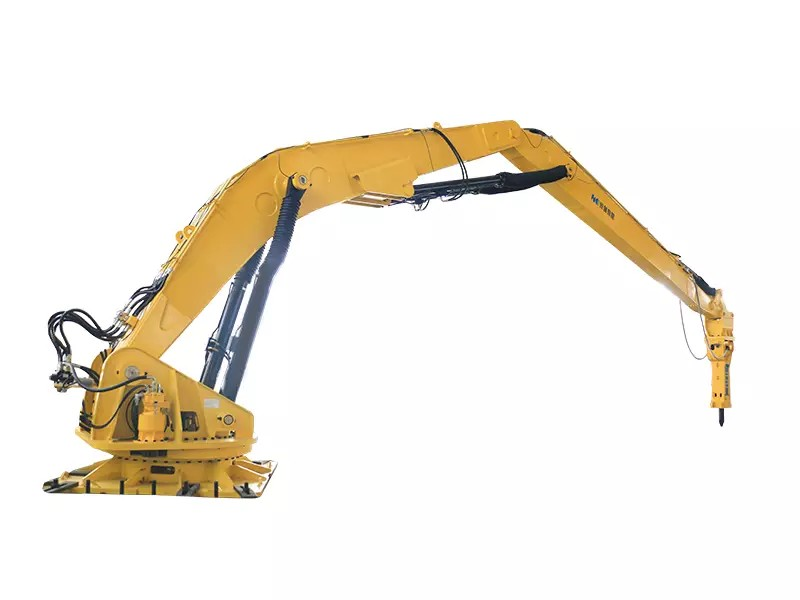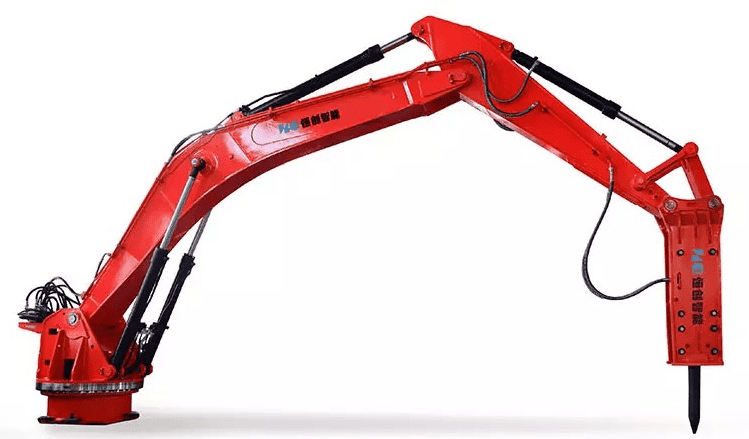Rock breakers are essential tools in modern mining, quarrying, and heavy industrial applications. Whether addressing oversized rocks blocking crusher inlets, managing material flow, or aiding in demolition tasks, rock breakers increase operational efficiency and safety. The rock breaker boom system, including its hydraulic and pedestal configurations, is a powerful machine designed to handle extreme environments, making it an indispensable asset for the mining and construction industries.
In this article, we’ll explore what rock breakers are, their applications in mining, and why they’re critical for operational success. We’ll also compare different types of rock breaker systems and highlight how to choose the right solution for your needs.

A rock breaker, sometimes referred to as a hydraulic rock breaker, is a machine designed to break large rocks into smaller pieces. It is typically mounted on an excavator, a stationary pedestal, or other heavy machinery. This equipment uses a hydraulic hammer to deliver powerful blows that fracture rocks, enabling easier material handling and processing.
Rock breakers are particularly valuable in mining where oversized rocks can block crushers or conveyors, creating bottlenecks in production. With their precise control and robust impact force, rock breakers offer a safer, faster, and more efficient solution compared to manual methods.
Rock breaker boom systems are advanced machines that integrate hydraulics, heavy-duty components, and intelligent controls. The following features make these systems indispensable in mining and related industries:
Rock breaker boom systems are built from high-strength steel to handle loads of up to 8,000 kg. This strength ensures they can withstand the harsh conditions commonly encountered in mining and construction.
Driven by hydraulic pumps with flow rates of up to 140 liters/min and pressure capabilities of up to 21 MPa, these systems deliver consistent impact energy. This power ensures even the hardest rocks can be broken efficiently.
With 360° continuous rotation and a maximum reach of 9,090 mm, rock breaker boom systems offer exceptional flexibility, making them suitable for both confined underground spaces and vast open-pit mines.
Equipped with overload protection, emergency stop functions, and manual control options, these systems prioritize safety for operators and equipment.
Electric hydraulic proportional valves and ergonomic handles allow for precise operation, reducing the risk of damage to surrounding infrastructure.
In open-pit mining, rockbreaker boom systems are used to remove oversized rocks at the crusher feed inlet, ensuring smooth material flow. By breaking down large rocks into manageable sizes, these systems prevent downtime caused by blockages.
For underground operations, compact rock breaker machines can efficiently break rocks in narrow ore passes, draw points, and haulage areas. Their compact size and maneuverability make them ideal for confined spaces where traditional equipment cannot operate.
In quarries, stationary rock breakers are installed to break large boulders into smaller stones that can be processed by crushers. This improves productivity and reduces equipment wear and tear.
Rock breakers are also widely used in demolition and recycling industries. They can dismantle reinforced concrete structures, remove debris, and handle bulky materials in hazardous environments.
Rock breaker systems come in various configurations to suit different applications. Below is a comparison of the most common types:
| Feature | Mobile Rock Breaker | Stationary Rock Breaker (Pedestal Boom System) |
|---|---|---|
| Application | Quarrying, demolition, construction | Mining, primary crushing stations |
| Mobility | High flexibility, portable | Fixed, installed in a single location |
| Impact Force | Moderate | High |
| Reach | Variable, depends on carrier | Fixed, up to 9,090 mm |
| Maintenance Requirements | Higher due to mobility | Lower due to stationary design |
| Initial Cost | Lower | Higher |
| Production Capacity | Moderate | High, continuous operations |
Selecting the right rock breaker machine is crucial for optimizing productivity and ensuring safety in mining operations. Here are the key factors to consider:
The size and hardness of rocks determine the impact energy required. Hard materials like granite or basalt may require hydraulic systems capable of delivering 3,000–15,000 joules of impact energy.
Ensure the rock breaker system can integrate seamlessly with your existing crushers, feeders, or excavators.
Higher hydraulic flow rates and pressure capabilities translate to greater breaking power. Choose a system that matches the power output of your carrier.
Look for systems with remote operation capabilities, emergency stops, and overload protection to improve safety in hazardous environments.
Rock breakers offer numerous advantages over traditional manual methods or blasting techniques:
| Feature | Rock Breaker System | Manual Methods |
|---|---|---|
| Safety | Remote operation reduces risks | High risk of worker injury |
| Efficiency | Faster and more reliable | Time-consuming and labor-intensive |
| Durability | Built for harsh environments | Prone to wear and tear |
| Precision | Hydraulic control ensures accuracy | Limited precision |
One notable example of a successful rock breaker application is the HCBMR-6535D Rockbreaker Boom System by Hitech. This system features:
In an underground mining project, this system improved material flow by 25% and reduced downtime caused by crusher blockages by 40%. Its durability and precision controls made it a cost-effective solution for the customer.

Next-generation rock breakers will feature autonomous navigation and AI-powered sensors to identify optimal breaking points and enhance efficiency.
Eco-friendly designs, such as hybrid diesel-electric systems, are being developed to reduce emissions without compromising performance.
Advancements in materials, such as graphene composites and self-healing ceramics, will extend the lifespan of rock breaker components.
Rock breakers, including hydraulic rock breakers and pedestal boom systems, are critical for improving safety, efficiency, and productivity in mining operations. Their versatility and power make them indispensable for handling oversized rocks, clearing blockages, and managing material flow.
For industries seeking cutting-edge solutions, Hitech offers a comprehensive range of rock breaker boom systems designed to meet the demands of modern mining. Visit www.hcrot.com to explore how these advanced systems can revolutionize your mining operations.